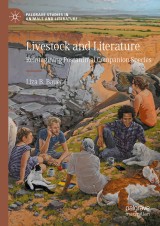Details
Livestock and Literature
Reimagining Postanimal Companion SpeciesPalgrave Studies in Animals and Literature
|
CHF 165.50 |
|
| Verlag: | Palgrave Macmillan |
| Format: | |
| Veröffentl.: | 08.08.2024 |
| ISBN/EAN: | 9783031581168 |
| Sprache: | englisch |
| Anzahl Seiten: | 304 |
Dieses eBook enthält ein Wasserzeichen.
Beschreibungen
<p>This book explores the past and current traces that cows, pigs, chickens, and other animals used by humans have left in Anglophone literary fiction. In times of accelerated global warming, an acute pandemic, and breakthroughs in bioengineering practices, discussions on how to rethink the relationships to these animals have become as heated as perhaps never before. <em>Livestock and Literature</em> examines what literature has to contribute to these debates. In particular, it draws on counter-narratives to so-called livestock animals’ commodification in selected science- and speculative fiction (SF) works from the twenty-first century. These texts imagine ‘what if’ scenarios where “livestock” practice resistance, transform into biotechnologically modified, postanimal beings, or live in close companionship to humans. Via these three points of access, the study delineates the formal and thematic strategies SF authors apply to challenge anthropocentric and speciesist thought patterns. The aim is to shed light on how these alternative storyworlds expand readers’ understanding of the lives of farmed animals; seeking insight into how literature shapes human-animal relationships beyond the page.</p>
<p> </p>
<p> </p>
<p>1. Studying Farm Animal Representations in Twenty-First-Century Science- and Speculative Fiction (SF).- 2. Accessing the Forms and Functions of Farm Animal Narratives: A Hybrid Approach to Literary Animal Studies.- 3. Industrializing the Imagination: Farm Animal Uprisings in Literature from before and after 1900.- 4. (Re-)Imagining Farm Animal Characters in and through Science- and Speculative Fiction.- 5. Eating Well in Margaret Atwood’s MaddAddam Trilogy (2003–2013): Biotech Farm Animals and a Hopeful .- 6. “I am Sitting in a Kitchen, Talking to a Sheep”: Looking through Postanimal Eyes in Adam Roberts’ Bête (2014).- 7. How to Forget the Cages: On the Gains and Limitations to Imagining ›Livestock‹ in the Laboratory of Literature.</p><p><br></p>
<p><strong>Liza B. Bauer </strong>is the Interim Scientific Manager of the Panel on Planetary Thinking and co-speaker of the interdisciplinary research section on Human-Animal Studies at the Justus Liebig University, Giessen, Germany. </p>
<p>"This innovative, richly synthetic, and field-extending study explores literary narratives—in particular, works of science fiction and speculative fiction—that envision farmed animals as agential participants in multispecies futures. Drawing on research in literary animal studies, narrative theory, anthropology, philosophy, and other domains, the author maps out textual engagements with postanimality, whereby nonhuman animals caught up in the exploitative dynamics of industrialized meat production become inextricably interlinked with humans as well as (bio)technologies. Through detailed, state-of-the-art analyses of storytelling practices by a range of writers—from Margaret Atwood and Laura Jean McKay to Deb Olin Unferth and Adam Roberts—Literature and Livestock compellingly reframes narrative as a space of possibility in which disvalued and elided animal lives can be imagined otherwise."<br>
—<strong>David Herman</strong>, author of Narratology beyond the Human: Storytelling and Animal Life</p>
<p>This book explores the past and current traces that cows, pigs, chickens, and other animals used by humans have left in Anglophone literary fiction. In times of accelerated global warming, an acute pandemic, and breakthroughs in bioengineering practices, discussions on how to rethink the relationships to these animals have become as heated as perhaps never before. <em>Livestock and Literature</em> examines what literature has to contribute to these debates. In particular, it draws on counter-narratives to so-called livestock animals’ commodification in selected science- and speculative fiction (SF) works from the twenty-first century. These texts imagine ‘what if’ scenarios where “livestock” practice resistance, transform into biotechnologically modified, postanimal beings, or live in close companionship to humans. Via these three points of access, the study delineates the formal and thematic strategies SF authors apply to challenge anthropocentric and speciesist thought patterns. The aim is to shed light on how these alternative storyworlds expand readers’ understanding of the lives of farmed animals; seeking insight into how literature shapes human-animal relationships beyond the page.</p>
<p><strong>Liza B. Bauer</strong> is Interim Scientific Manager of the Panel on Planetary Thinking and co-speaker of the interdisciplinary research section on Human-Animal Studies at the Justus Liebig University, Giessen, Germany. </p>
—<strong>David Herman</strong>, author of Narratology beyond the Human: Storytelling and Animal Life</p>
<p>This book explores the past and current traces that cows, pigs, chickens, and other animals used by humans have left in Anglophone literary fiction. In times of accelerated global warming, an acute pandemic, and breakthroughs in bioengineering practices, discussions on how to rethink the relationships to these animals have become as heated as perhaps never before. <em>Livestock and Literature</em> examines what literature has to contribute to these debates. In particular, it draws on counter-narratives to so-called livestock animals’ commodification in selected science- and speculative fiction (SF) works from the twenty-first century. These texts imagine ‘what if’ scenarios where “livestock” practice resistance, transform into biotechnologically modified, postanimal beings, or live in close companionship to humans. Via these three points of access, the study delineates the formal and thematic strategies SF authors apply to challenge anthropocentric and speciesist thought patterns. The aim is to shed light on how these alternative storyworlds expand readers’ understanding of the lives of farmed animals; seeking insight into how literature shapes human-animal relationships beyond the page.</p>
<p><strong>Liza B. Bauer</strong> is Interim Scientific Manager of the Panel on Planetary Thinking and co-speaker of the interdisciplinary research section on Human-Animal Studies at the Justus Liebig University, Giessen, Germany. </p>
Presents an approach to reading and studying farm animal narratives Showcases literature's significance in discourse on species extinction Uses science fiction to consider postanimal futures
Diese Produkte könnten Sie auch interessieren:

The Enigma of Good and Evil: The Moral Sentiment in Literature
von: Anna-Teresa Tymieniecka
Preis: CHF 354.00
-
-
© 2024 media control GmbH
Alle Preise enthalten die gesetzliche Mehrwertsteuer. - AGB
- Impressum
- Datenschutzerklärung
- Kontakt
- FAQ
- Mein Konto
- Home
- Erweiterte Suche
- Widerrufsrecht
- Reader-Software
- Desktop-Ansicht
- Gutschein-Code einlösen


